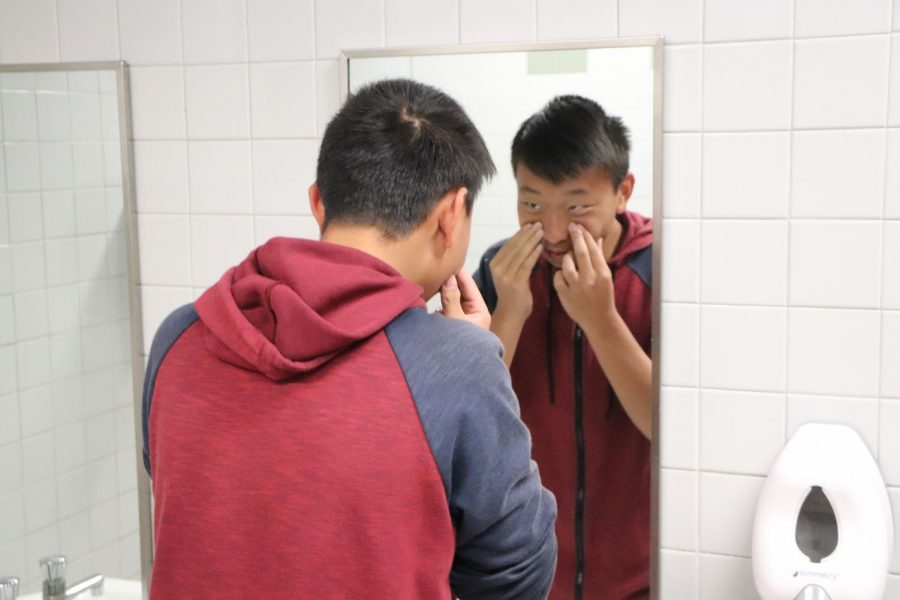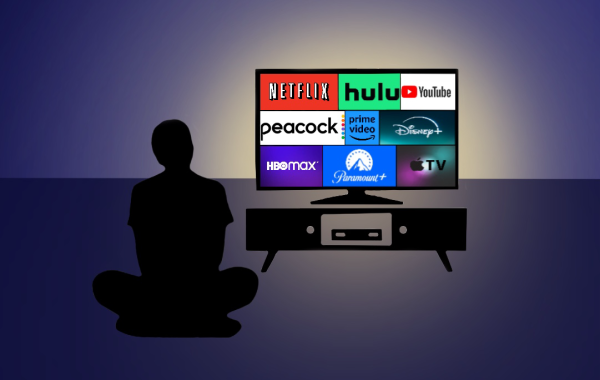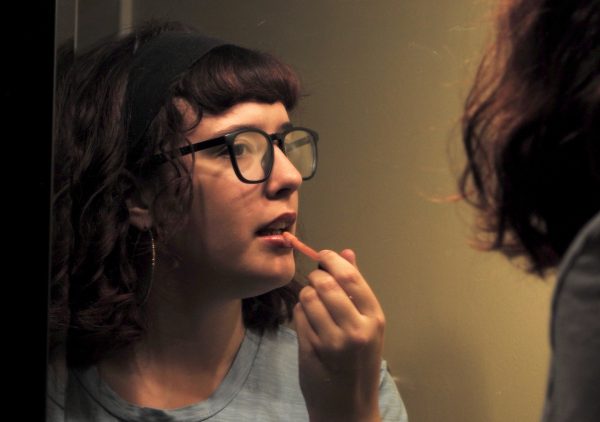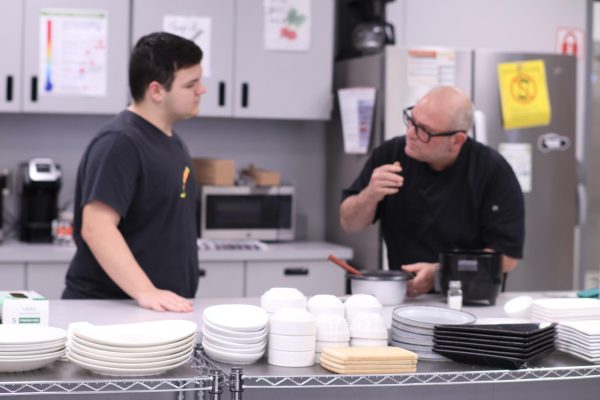A spot of confidence
While acne can be a struggle, students are able to find ways to overcome this challenge.
photo by Chatham Farrell
Sophomore Nicolas Cai examines his skin in the bathroom. Cai;s daily regimen consists of a face wash in the morning.
The action of popping a pimple seems all too familiar: one inspects their skin microscopically until they find a blemish or a raised bump that just screams to be prodded at, despite our brains telling us this a bad decision. Logic, however, is not a deterrence, and within seconds, there is white, oily gunk oozing out of the previously closed wound on our face.
“The stuff that comes out is full of bacteria and you just end up spreading it, which causes more acne to pop up. It just made me feel bad because it would get worse the next day,” sophomore Meg Carlson said.
Zit busting and skin problems are a part of many student’s lives; Johns Hopkins Medicine reports in 2018 that acne affects millions of individuals, which also includes adults. Still, talking about skincare is almost taboo, something that many skirt around, or do not discuss at all.
“I think people avoid it because it is not easy to talk about it without upsetting people, because acne without any kind of treatment is largely out of people’s control,” sophomore Samuel Morris said.
Skin issues, however, can escalate further than the periodic pimple, patch of blackheads, or bouts of rough skin that average people deal with. Conditions such as overtly oily or dry epidermis, cystic acne, and constant redness are challenges that are damaging to the self-esteem of those who suffer.
“It’s pretty much redness. My skin has been like that since 6th grade; it used to bother me so much, I would deliberately skip school,” sophomore Gigi Mendez said.
The thought of being seen by other people induced anxiety and self-consciousness to a higher degree than what one feel with smoother skin. Students felt that people would judge them or believe in certain misconceptions, which led to absence of conversation about it.
These doubts and insecurities are difficult for some to overcome. Morris, who suffered from severe acne in middle school, never stopped caring about his complexion until it cleared up through use of Accutane; it was always lurking in the back of his mind. He had started working out to stop thinking about his acne, believing that he would “tire himself out.” In the end, for some, outward appearance was a constant, damaging, blow to their confidence.
“Acne was a huge looming cloud over my self-esteem. A lot of the time I would tell myself that once it was gone maybe then I would finally be attractive, and I held onto that. I never really got over it to be honest,” sophomore Chanson Cadet said.
Along with shattered self-esteem, students can turn to unhealthy habits and products in an attempt to rid themselves of their glaringly obvious skin afflictions, with some doing more harm than good. Sophomore Bella Skidmore had tried to use toothpaste to dry out a pimple, after her friend had recommended it. While toothpaste may be quick and accessible, it is an ingredient that can be rough on the skin. In a report with Healthline, Dr. Tsippora Shainhouse, board-certified dermatologist, warns that toothpaste can be irritating to the skin and cause more breakouts because it is only formulated for teeth.
Others turned to the lure of promising products that advertised perfect skin. Cadet invested in Proactiv, a popular skincare line heavily marketed towards teenagers. While this was not advised by her dermatologist, she went ahead with the line anyway, only for it to make matters worse.
Cadet primarily used Proactiv because of its popularity. However, after a few weeks, her skin began to feel very dry, “kind of like the Sahara without rain.”
Carlson also had challenges regarding the products she used on her face. Just like Cadet, the drugstore products she chose to use in the beginning were causing more damage to her skin, the opposite effect of what she desired.
“ A lot of drugstore products have harsh chemicals that are not healthy for your skin at all, even though they market them to be, so I would read the labels of what you put on your face,” Carlson said.
Despite difficulties with self-image, there is a growing trend of skin positivity, or embracing skin even with certain physical flaws. Sophomore Nicolas Cai embodies this ideology, taming his initial self-consciousness.
“With time and experience, I have learned to accept my current situation at face value and aim for improvement rather than unsatisfaction,” Cai said.
Senior Jacob Steinebronn acknowledges the need for improvement regarding one’s visual appearance, but also believes this new way of thinking can be “dangerous.” Steinebronn sees it as something that discourages an individual’s bettering of themselves.
With this movement, a large number of celebrities with young audiences have spoken out, with one prominent example being supermodel Kendall Jenner. Jenner, who has amassed millions of followers on multiple social media platforms has been vocal about her struggle with acne and has posted the occasional picture and video on her Twitter documenting her skincare routine.
Skin positivity in society and pop culture can be helpful to others by allowing those with certain skin types to still feel positive.
“I love the growing trend of people being more accepting of troubled skin because it helps all the people out there that are struggling to accept their insecurities,” Skidmore said.
Along with reinforcement through the media, there were other strategies students utilized to feel confident about what they looked like, or even to stop caring about their image. Carlson chose to put more value and focus into other aspects of life. Describing herself as someone who prioritizes comfort over fashion, found that there were more important things to life, in spite of her admittance that acne did not make her feel good about herself.
“I also knew there was nothing I could do about it, and that it would take however long it took to clear up, and that was that. I guess I was just able to realize here were more important things in life to worry about and I just let it be,” Carlson said.
A large sentiment held by many who had severe skin issues is patience, as well as consistency. While this seems impossible, students are assured that eventually, their skin will get better. Whether it be an extreme case, or the occasional protruding spot, teens recommend a healthy skincare regimen, and a positive outlook.
“Having acne is just a part of life. Relax, acne isn’t deadly,” Cadet said.
Your donation will support the student journalists of Hagerty High School. We are an ad-free publication, and your contribution helps us publish six issues of the BluePrint and cover our annual website hosting costs. Thank you so much!












